A foster child’s long ordeal in a South Richmond hospital emergency room makes clear the stakes in an impending budget showdown in a divided General Assembly.
Virginia faces a lawsuit over its failure to find a bed in its overwhelmed and understaffed mental hospitals for the girl, a ward of the Giles County Department of Social Services who was found a danger to herself or others during a psychiatric crisis in February. She sat in the emergency room at HCA-Chippenham Hospital for four days under police custody before being taken, untreated, to Giles on the other side of Virginia.
But a Giles official says the state still could forestall the lawsuit if it makes the necessary investments in its mental health system, particularly the Commonwealth Center for Children and Adolescents in Staunton.
People are also reading…
The center is the only state hospital for children and youth with behavioral health disorders, with just 48 beds, but it is operating at 40% of its capacity because it doesn’t have staff to treat more patients safely.

A youth in foster care suffering a mental health crisis waited for more than four days under…
“We’re going to let things sit for awhile,” said Giles County Attorney Richard Chidester, who filed the suit in late February. “I know they’re working on trying to get some staff, so we’re going to give them a chance to do it.”
That is the challenge for the General Assembly and Gov. Glenn Youngkin. They are at war over almost $3 billion that the new Republican governor and his allies in the House of Delegates want for tax cuts and other priorities, while the Democratic-controlled Senate insists on investing more in core services, particularly behavioral health and public education.
Lawmakers return to Richmond Monday for a special session to complete work on the budget and other business that was unfinished when legislators adjourned the regular session March 12. Other unresolved issues range from funding for “lab schools” and a Washington Commanders football stadium to filling two seats on the state Supreme Court.
As for the Giles suit: “That suit could have been filed dozens of times before now – it was just waiting to happen,” said Sen. Creigh Deeds, D-Bath, chairman of the Behavioral Health Commission, whose family tragedy led to a 2014 law that requires state mental hospitals to accept patients under temporary detention orders as a last resort.
For behavioral health, the budget fight centers on immediate efforts to raise pay for nurses and direct-care aides to stop an exodus of trained staff that has intensified during the COVID-19 pandemic. But the larger challenge is investing money in community-based services to relieve pressure on public and private hospitals and move away from Virginia’s traditional emphasis on institutional care.
“We have people counting on us, and they’re counting on the services,” said Deeds, whose 24-year-old old son, Gus, stabbed his father and then killed himself in late 2013, 13 hours after being released from custody because the mental health system failed to find a bed for him.

One-time hazard pay is on its way to almost 26,000 aides for home health care and personal c…
Sen. Emmett Hanger, R-Augusta, whose district includes the Commonwealth Center and Western State Hospital, is one of 14 budget negotiators working on a compromise for the special legislative session.
Hanger believes it is possible for the assembly to deliver significant tax relief and invest more in essential services – but not if it approves all of the tax cuts Youngkin wants.
“I don’t think the governor’s expectation should be that he gets everything at one time,” he said.
A swing vote in the closely divided Senate, Hanger does not favor acting now to double the standard deduction for state income taxes. That $2.1 billion proposal is at the heart of Youngkin’s $5.5 billion package of proposed tax cuts and one-time rebates in a pair of pending state budgets – one updating spending for the fiscal year that ends June 30 and the other for the two fiscal years that start July 1.
“I don’t think it would be prudent,” Hanger said in an interview. “It would limit our ability to adequately fund core services.”
Youngkin made reform of the mental health system a political priority in his campaign for governor last year.
“We’re in a state of crisis,” he said in December after his Democratic predecessor, Gov. Ralph Northam, proposed more than $560 million in new spending on behavioral health in budgets the departing governor introduced for the current fiscal year that ends on June 30 and for the next two years, beginning July 1.
That money – especially funding to raise the salaries of front-line hospital staff to the 75th percentile of the labor market – is crucial to the success of a strategic plan the new administration is developing for Virginia’s fragmented system, said Nelson Smith, a former private hospital executive whom Youngkin appointed as behavioral health commissioner.
“What we really need is more investment,” Smith said in an interview on Friday.
Youngkin spokesperson Macaulay Porter said Friday that the governor is working with legislators “to find long-term solutions to ensure that care is accessible and there are much-needed improvements to state hospital services and community mental health services.”
Budget discussions “are also focused on increasing historically low salaries at state hospitals, bolstering behavioral health and crisis services across Virginia, improving the discharge processes at state hospitals and developing an alternative custody service to relieve law enforcement of long hours waiting with patients in emergency departments,” Porter said.
“We can provide needed tax relief for Virginians and improve our behavioral health system in Virginia, at the same time.”
The House version of the budget includes all of the tax cuts Youngkin advocated as well as many of his other priorities – $150 million for “laboratory schools” outside of the traditional public school system; and additional funding for economic development, cybersecurity and workforce training.
The governor asked for more than $3.4 billion in tax cuts and new spending on top of the budgets that Northam introduced in December. The departing governor had proposed more than $1 billion in new spending for this fiscal year and $10.5 billion in the $158 billion budget for the next two fiscal years, thanks to a surging economy and federal emergency spending during the pandemic.
Youngkin did not recommend how to pay for his priorities, but he added $1.25 billion in revenue for this fiscal year in a mid-session reforecast in February, much of it to be banked in financial reserves. He did not offer additional resources for the next two years because of uncertainty about the economy.
The Senate budget has about $2.8 billion more to spend because it didn’t agree to double the standard deduction or repeal the 1% local option portion of the sales tax on groceries. The Senate endorsed Northam’s proposal to cut the 1.5% state share of the grocery tax, while using state money to replace revenue lost for local school divisions, but not transportation improvements.
It also offered a slightly smaller tax rebate out of surplus revenues this year – about $1 billion – and cut in half the governor’s proposal to exempt up to $40,000 in military retirement income from state taxes.
The Senate flatly rejected the governor’s first attempt to roll back a 5-cent-per-gallon increase in the gas tax over 12 months. Democrats appear poised to do the same to his latest bid to suspend the entire 26.2-cent-per-gallon tax for three months, while capping future increases for inflation.

Gov. Glenn Youngkin on Wednesday proposed suspending the state’s 26-cent gas tax for three months.
The Senate wants to offer one tax benefit that the House and governor don’t support, making a portion of the earned income tax credit refundable for working, low-income families that don’t pay enough in state taxes to use the entire credit.
The gulf in resources between the House and Senate versions of the budget makes a big difference in how much they can spend on core services, such as K-12 education, compensation for public employees and behavioral health.
The Senate budget would keep all of the money Northam proposed for a 10% salary increase for teachers, state employees and state-supported local employees over two years, while adding a $1,000 bonus on June 1. The House would replace 1% of the raise each year with a $1,000 bonus.
The House budget also made deep cuts in the money the former governor proposed for school divisions, including Richmond, with high percentages of students considered “at risk” because of poverty, as well as for early childhood education and total per-pupil funding.
The Senate kept that money in the budget and added substantially to it, partly removing a cap on state funds for school support positions imposed during the Great Recession. (The House also added money to pay a state share for elementary school principals and vice principals.)
The two budgets also take different approaches to the thorny and expensive challenge of helping local school divisions replace or repair old, crumbling schools – especially those in urban and rural areas that don’t have the money or debt capacity to take out big loans.
The Senate wants use $500 million Northam proposed to create a new fund for making grants to localities while expanding the capacity of the Literary Fund to make low-interest loans. The House wants a loan-rebate program that would use state tax funds and money from the Literary Fund to leverage up to $2 billion in interest-free loans, while rebating a portion of the loan principal for poor school divisions.
House Appropriations Chairman Barry Knight, R-Virginia Beach, said he expects a compromise that will combine the two approaches, which also are reflected in several House and Senate bills that must be negotiated and reconciled in the upcoming special session.
Legislation to help usher in more lab schools also hangs in the balance; and, after tax cuts, is a top Youngkin priority. When lawmakers left Richmond March 12, Senate Democrats were firm on legislation that would allow colleges and universities with and without teacher prep programs to open such schools; but, the Senate version provided no path to fund the schools through existing public education dollars – a key piece of the proposal from House Republicans.
The assembly also must resolve a number of non-budget issues, most notably to fill two vacancies on the Virginia Supreme Court. Justice William Mims retired on Thursday, two months after former Chief Justice Donald Lemons stepped down from the bench. The legislature also might need to appoint new judges on the Virginia Court of Appeals, if any of its judges rise to the high court.
Other unresolved issues include disputes over proposals to: expand the State Board of Elections and change how its members are appointed; create a searchable campaign finance database; and increase penalties for hazing.
But the unfinished budget will be the centerpiece of the special session, with behavioral health remaining one of the biggest challenges lawmakers face as they also try to deliver the tax cuts Youngkin seeks.
They start with big investments Northam proposed the month before he left office, to raise pay for embattled direct-care staff and reduce crowding in state hospitals, while expanding crucial services for people with mental health disorders or developmental/intellectual disabilities in communities across Virginia.
“It was a historic budget on its own before we started messing with it,” said Del. Mark Sickles, D-Fairfax, a House budget negotiator.
The House and Senate rejected Northam’s proposal to reserve $100 million for a study next year of how to transform the behavioral health system, preferring to keep the money for services needed now.
Both chambers generally support Northam’s priorities for raising Medicaid reimbursements for private providers of community services, higher compensation for hospital and community services board staff, and money to expand essential services in every community under the STEP-VA program.
But they differ substantially on the scope of those investments and the source of money for them, which reflects the big gap in available funding in their respective budgets because of the battle over tax cuts.
The most urgent challenge is stabilizing state mental hospitals, which became so crowded and understaffed during the pandemic last year that then-Behavioral Health Commissioner Alison Land temporarily halted admissions at five of them.

The COVID-19 pandemic also has thrown the hospitals into a staffing crisis with 1,547 direct-care jobs vacant in a workforce of 5,500 — a job vacancy rate of 28%.
Commonwealth Center has been operating no more than half of its 48 beds – the only state psychiatric hospital beds for children and adolescents – and as few as 12 because it hasn’t had the employees necessary to safely care for patients who are often aggressive. Some of those patients have intellectual or developmental disabilities, such as autism, and others come from foster care or the juvenile justice system.
It’s hard to find beds for those children and teens in private hospitals, which also are struggling to hire and retain staff, but don’t have the state’s obligation under the “last resort” law to accept patients under involuntary temporary detention orders because they pose a threat to themselves or others.
“I think the private hospitals are facing the same pressures as CCCA,” said Jennifer Fidura, executive director of the Virginia Network of Private Providers. “Part of the pressure is staff. Part of the pressure is people are getting hurt. The people coming in the door are challenging.”

STAUNTON — When the aides who work at Commonwealth Center for Children & Adolescents pic…
“The difference is the private sector can say ‘no’,” Fidura said. “CCCA is not supposed to say ‘no’.”
But the Commonwealth Center refused to admit the foster child in late February, according to the Giles lawsuit, which alleges the state violated the “last resort” law it passed in 2014 to prevent people from being released without treatment after being found a threat to themselves or others.
It’s not clear why the foster child was not admitted at Tucker Pavilion, an HCA-Virginia psychiatric facility next to Chippenham Hospital, where she waited for four days under the custody of a Chesterfield County police officer.
HCA said in a statement last month that Tucker offers a wide range of services to children and teens from 5 to 17 years old “if there is an appropriate bed available with the exception of patients we are not equipped to treat.”
“In those cases, we work with community partners to identify another facility to best meet the patient’s needs,” HCA said in the statement.
Chidester, the Giles county attorney, said the girl is receiving treatment, although he did not say where. The lawsuit said the girl’s social services workers had to drive from Giles to Richmond to retrieve her after her involuntary detention order expired.
“It’s a tough situation, and we’re in kind of a lose-lose position,” said Commissioner Smith, who could not comment on the lawsuit. “Kids shouldn’t be sitting there for a long, long time without treatment.”
The House reduced the amount of money Northam had proposed for salary increases for direct-care staff at the state hospitals by $23.5 million, which would lower the targeted pay from the 75th percentile of the market to the 50th percentile.
The Senate budget keeps all of the money, which the Youngkin administration agrees is necessary.
“Without the 75th percentile [in pay], our worry is that state facilities will fall further behind in being able to offer salaries commensurate with the risk incurred, as well as the needed skill set, for working in a behavioral health treatment center,” said Lauren Cunningham, spokesperson for the Virginia Department of Behavioral Health and Developmental Services.
Currently, pay for front-line staff at state hospitals ranks in the 10th percentile of the market, said Angela Harvell-Moore, deputy commissioner for facility services. “We’re already a few years behind the market.”
Virginia used a combination of federal emergency aid and state funds to improve compensation last year, using retention bonuses that have helped slow turnover and hiring bonuses that haven’t helped as much in recruiting new employees.
Smith, who previously worked for HCA, said private hospitals were “at the 75th percentile a year ago and they’re offering $20,000 signing bonuses.”
“But they still have large vacancies as well in their front-line staff,” he said.
Sickles questioned whether the pay goal is realistic and its potential for “cannibalizing” staff at community services boards and private providers. The House provided less money for community service board staff compensation, but it put the money into salary increases, while the Senate proposed bonuses.
“Salary is better, frankly, than the quarterly bonuses,” Deeds agreed.
Fidura said private providers will need higher state reimbursement rates to hire employees to “scale up” behavioral health services in communities.
“We’re all competing for staff,” she said. “We’re all competing for essentially the same dollars.”
Hanger contends the solution – for behavioral health and other core services, such as public education – will require even more funding than is available in either the Senate or House budget.
“We shouldn’t let this opportunity pass,” he said.
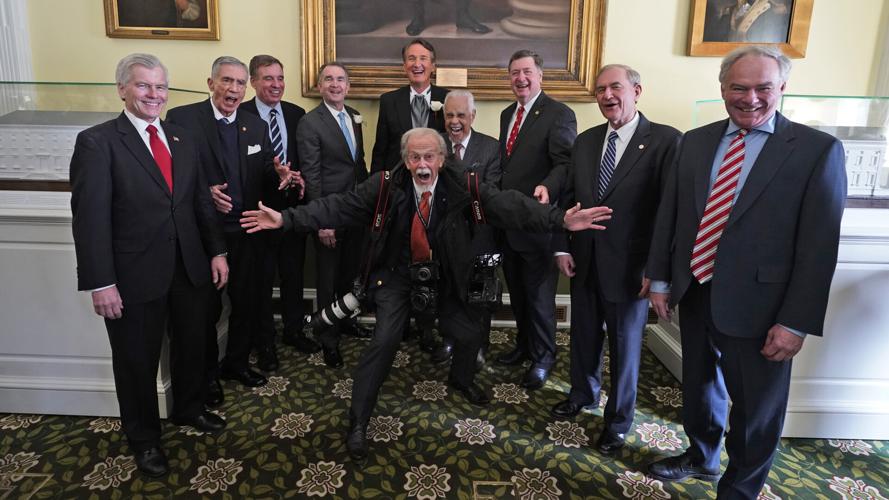
Virginia Governor Inauguration
Bob Brown is photographed with the new and former governors at the inauguration of Virginia Gov. Glenn Youngkin at the Capitol Saturday Jan. 15, 2022, in Richmond, Va. (AP Photo/Steve Helber)
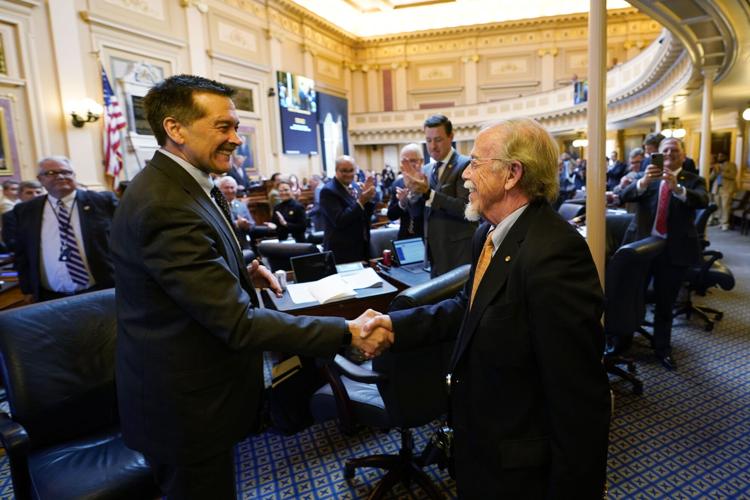
Virginia Legislature
Richmond Times Dispatch senior photographer, Bob Brown, right, shakes the hand of House majority leader, Del. Terry Kilgore, R-Scott, as Brown was honored for the announcement of his retirement during the House session at the Capitol Tuesday March 8, 2022, in Richmond, Va. Brown has covered the Virginia General Assembly for 52 sessions. (AP Photo/Steve Helber)
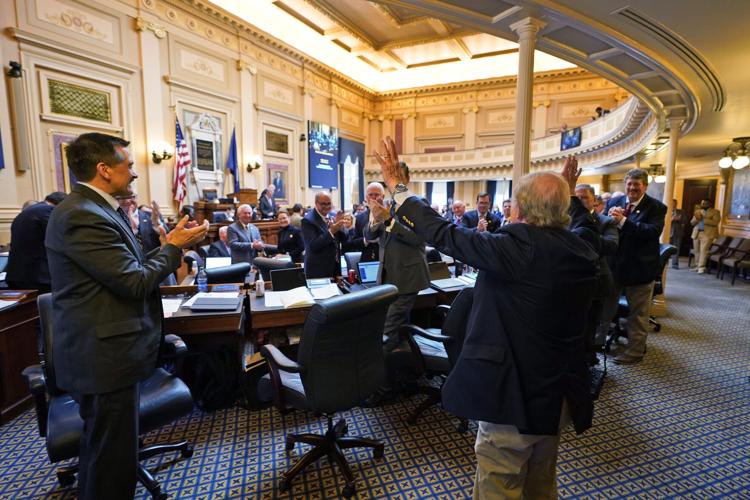
Virginia Legislature
Brown acknowledges House members during the House session at the Capitol Tuesday March 8, 2022, in Richmond, Va. (AP Photo/Steve Helber)
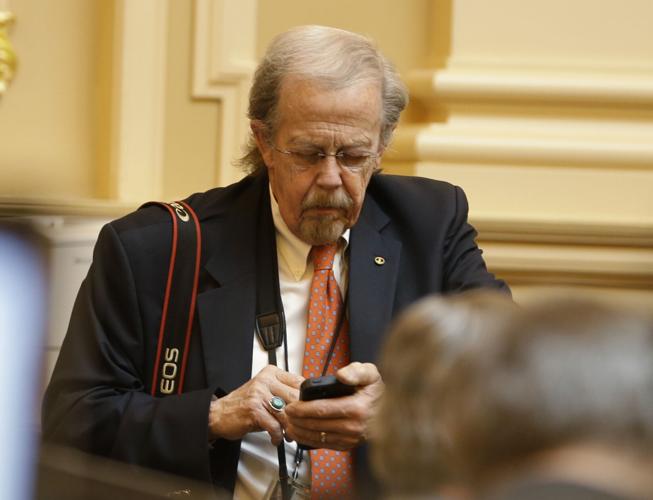
General Assembly
At the Capitol in Richmond, Va., Tuesday, Feb. 18, 2014. (AP Photo/Steve Helber)
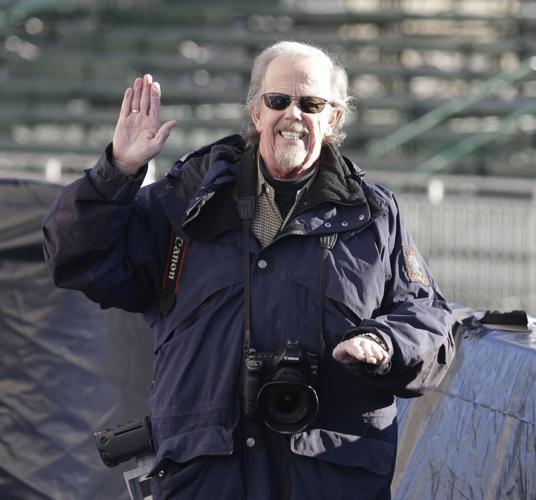
General Assembly Convenes
Bob Brown arrives for the opening ceremonies of the 2014 General Assembly at the Capitol in Richmond, Va., Friday, Jan. 3, 2014. (AP Photo/Steve Helber)
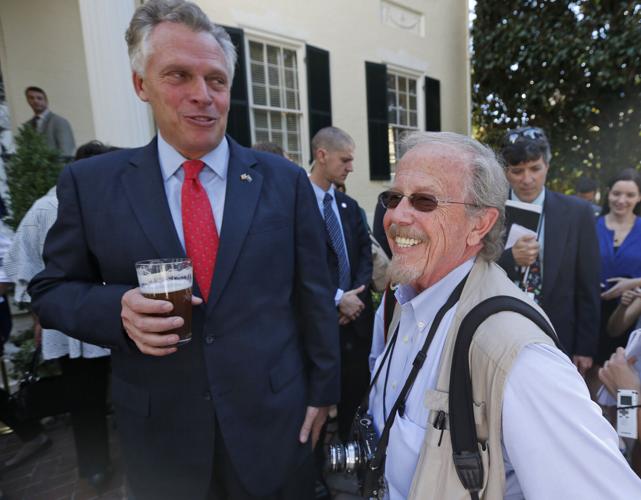
Stone Brewing Virginia
Virginia Gov. Terry McAuliffe with Bob Brown during an announcement that Stone Brewing Co., one of the nation’s top 10 craft breweries, is locating in Richmond during a news conference in Richmond, Va., Thursday, Oct. 9, 2014. (AP Photo/Steve Helber)
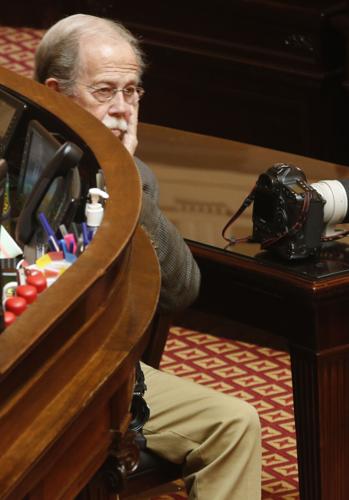
Virginia Legislature
During the session at the Capitol in Richmond, Va., Wednesday, Feb. 28, 2018. (AP Photo/Steve Helber)
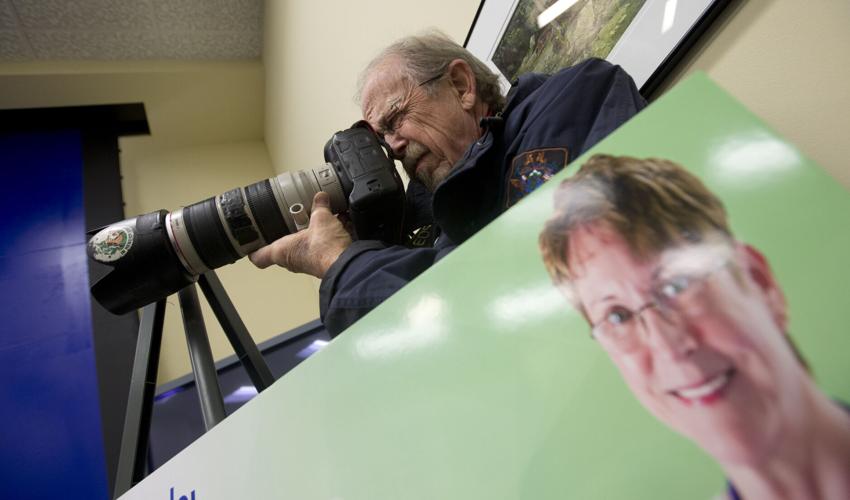
20220311_MET_BROWN_13
during a news conference by the Virginia Hospital & Healthcare Association at the Capitol in Richmond, Va., Wednesday, Jan. 20, 2016. (AP Photo/Steve Helber)
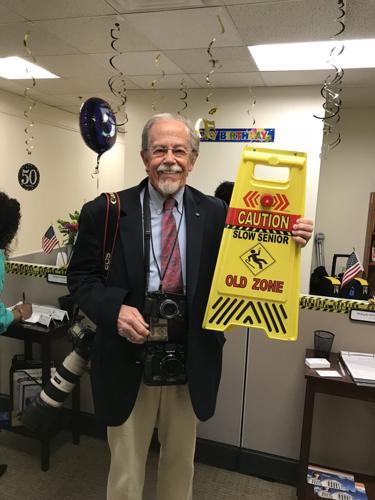
20220311_MET_BROWN_16
Bob Brown in the media room at the state Capitol.
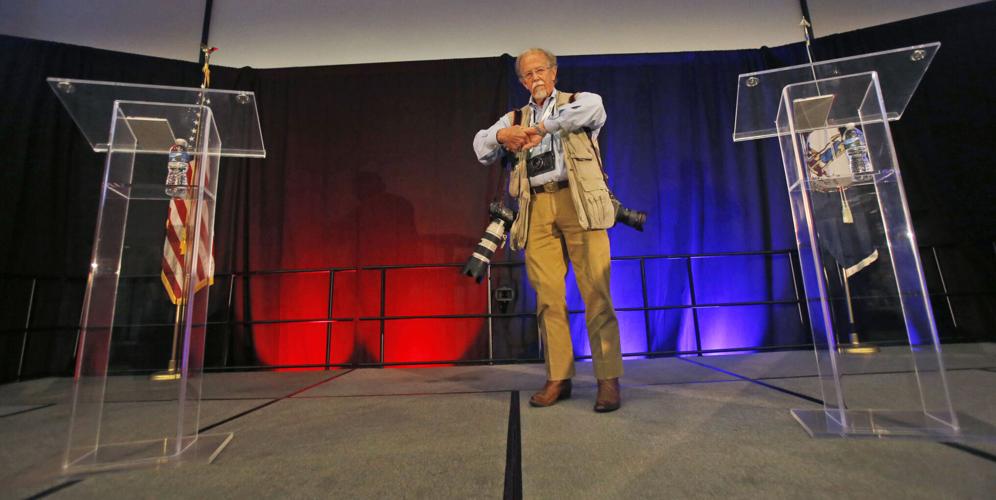
Election 2018 House Brat Spanberger
Bob Brown checks out the debate setting at Germanna Community College in Culpeper, Va., Monday, Oct. 15, 2018. (AP Photo/Steve Helber)
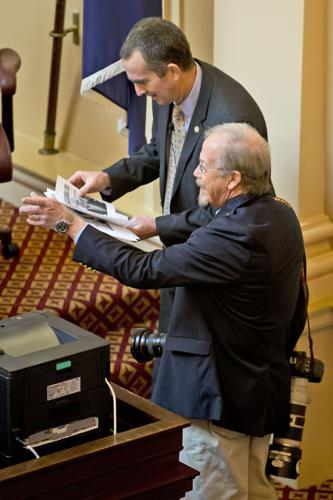
Legislatures Media Access
Bob Brown and Gov. Ralph Northam, during the Senate session at the Capitol in Richmond, Va., Friday, Jan. 15, 2016. (AP Photo/Steve Helber)
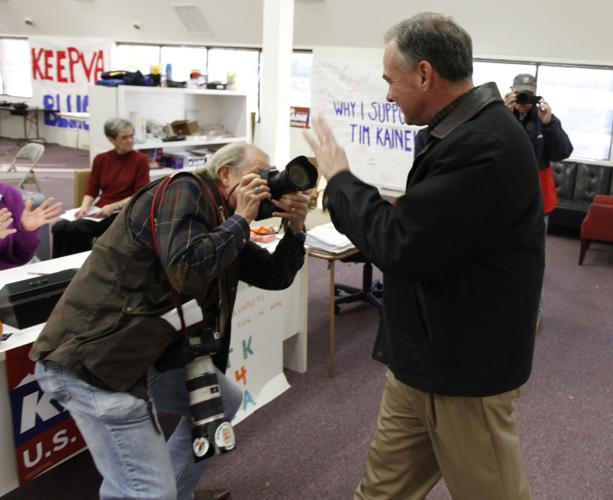
Kaine 2012
US Senate candidate former Gov. Timothy M. Kaine greest workers at his headquarters in Richmond, VA., Saturday, Nov. 3, 2012. (AP Photo/Steve Helber)
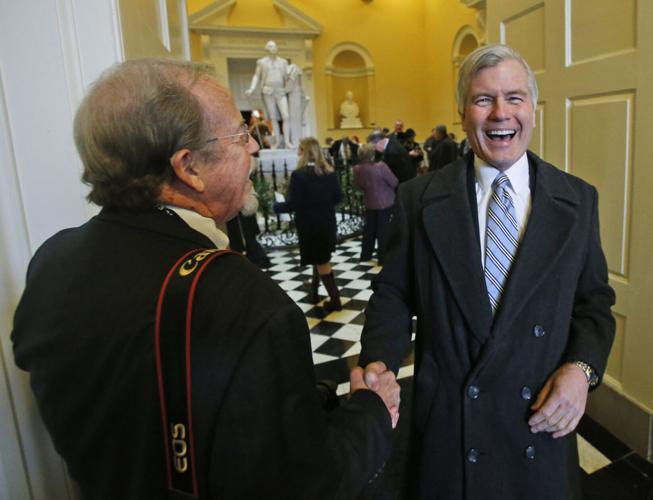
Virginia Inauguration
Bob Brown greets Gov. Bob McDonnell during the inauguration ceremony for Virginia Governor Ralph Northam at the Capitol in Richmond, Va., Saturday, Jan. 13, 2018. (AP Photo/Steve Helber)
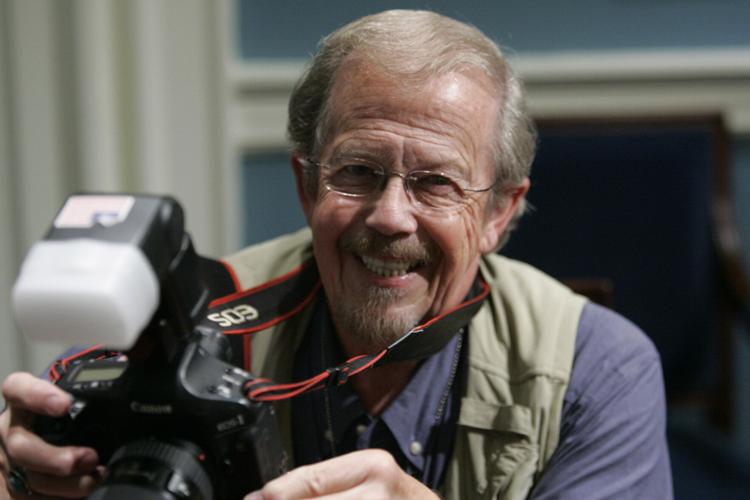
Kaine Transportation
At the Capitol in Richmond, Va., Thursday, July 10, 2008. Bob Brown was covering a press conference in which Gov. Tim Kaine expressed his disappointment at the inability of the General Asembly to pass transportation funding legislation. (AP Photo/Steve Helber)
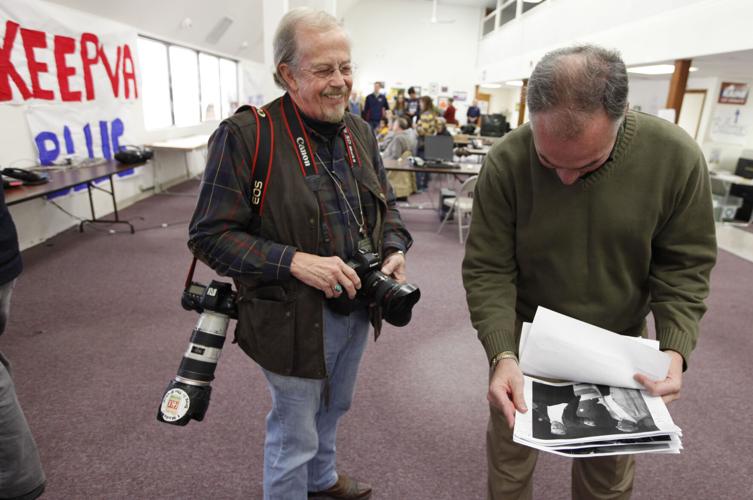
Kaine 2012
US Senate candidate and former Gov. Timothy M. Kaine gets a look at some of Bob Browns comedic work at his headquarters in Richmond, VA., Saturday, Nov. 3, 2012. (AP Photo/Steve Helber)
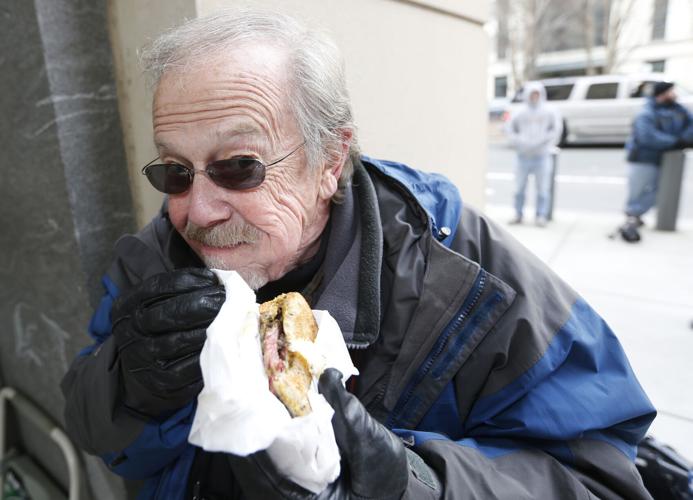
Former Governor Trial
Richmond Times-Dispatch senior photographer Bob Brown, has a quick bite while outside the federal courthouse in Richmond, during the trial of former Virginia Gov. Bob McDonnell and his wife, Tuesday, Jan. 6, 2015. (AP Photo/Steve Helber)
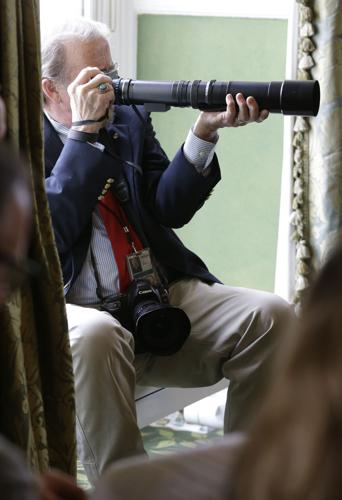
Medicaid Expansion
During the Senate session at the Capitol in Richmond, Va., Monday, April 7, 2014. (AP Photo/Steve Helber)
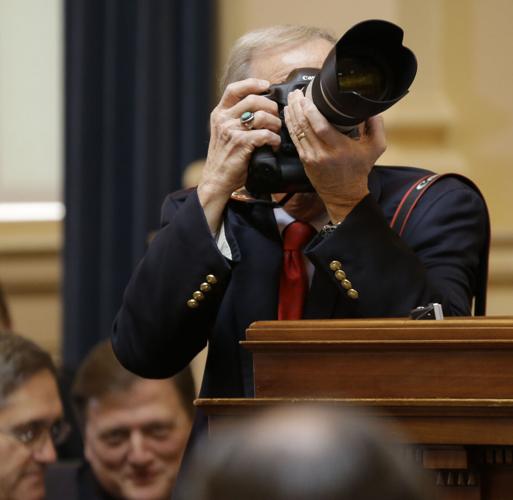
General Assembly
At the Capitol Thursday, Jan. 10, 2013 in Richmond, Va. (AP Photo/Steve Helber)
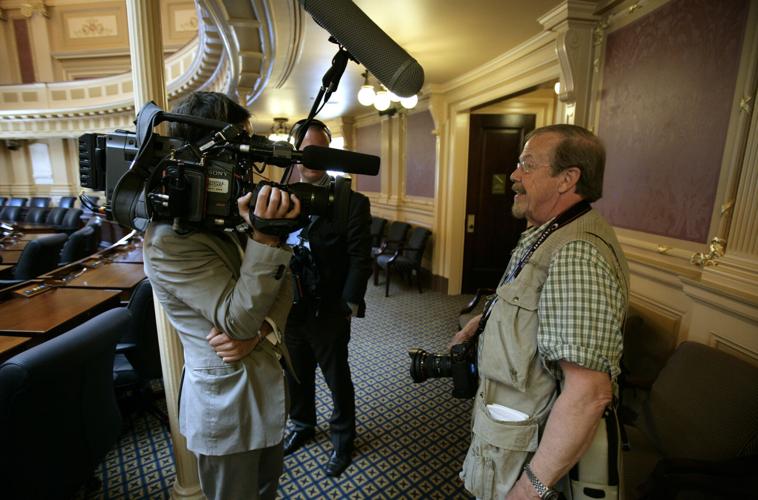
ROYAL VISIT
Brown is interviewed during preperations for the Royal visit at the Capitol in Richmond, Va., Wednesday, May 2, 2007. (AP Photo/Steve Helber)
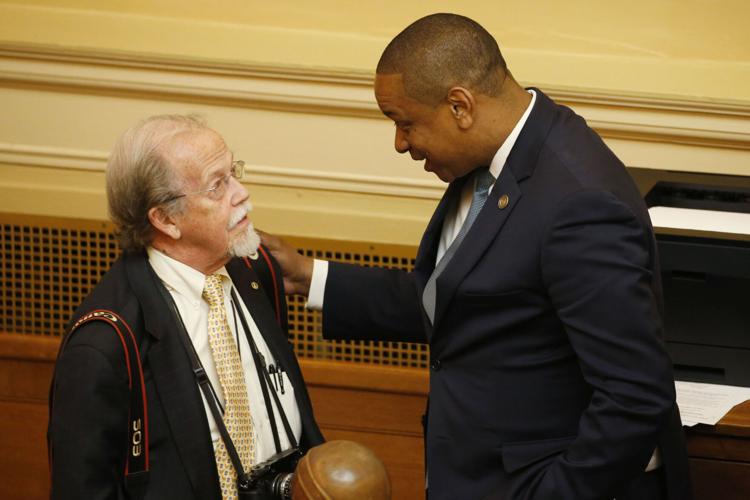
Virignia Legislature Democratic Takeover
Lt. Gov. Justin Fairfax and Bob Brown, right, at the State of the Commonwealth address before a joint session of the Virginia Assembly at the Virginia state Capitol in Richmond, Va., Wednesday, Jan. 8, 2020. (AP Photo/Steve Helber)
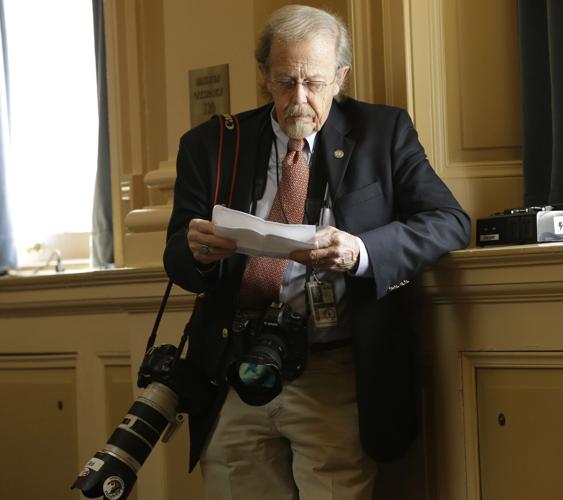
General Assembly
During the session at the Capitol in Richmond, Va., Tuesday, Feb. 11, 2014. (AP Photo/Steve Helber)
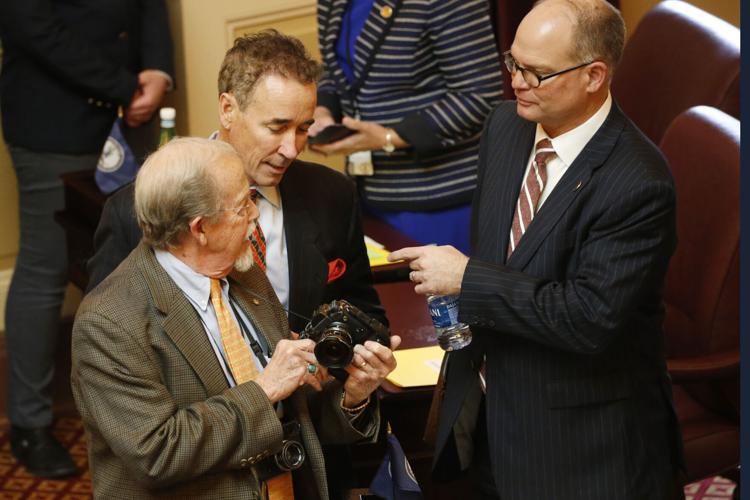
Washington Nationals
During the session at the Capitol Tuesday Jan 28, 2020, in Richmond, Va. (AP Photo/Steve Helber)
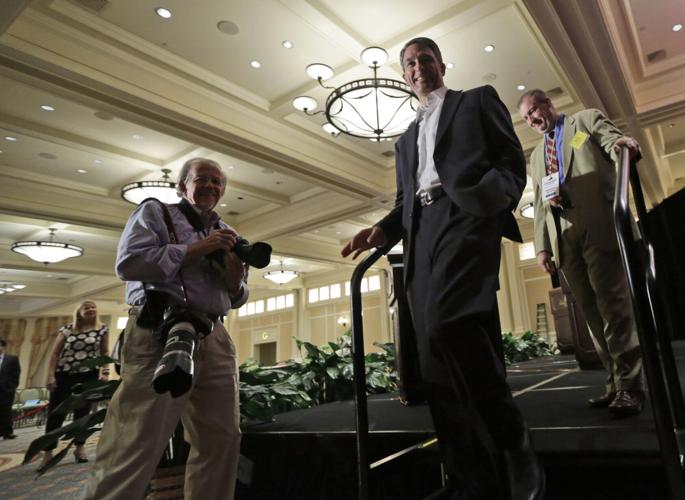
Governors Race Debate
Bob Brown covers Republican gubernatorial candidate Ken Cuccinelli as he does a walk through prior to the Virginia Bar Association convention debate at the Homestead in Hot Springs, Va. Saturday, July 20, 2013. (AP Photo/Steve Helber)
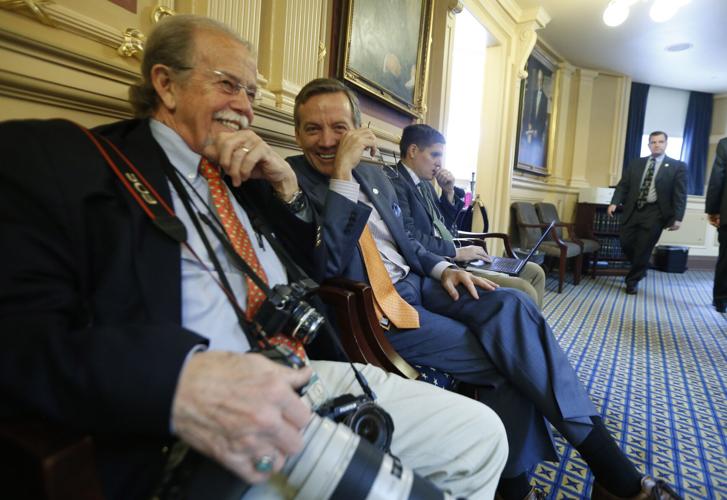
General Assembly
During the House session at the Capitol in Richmond, Va., Tuesday, Jan. 29, 2019. (AP Photo/Steve Helber)
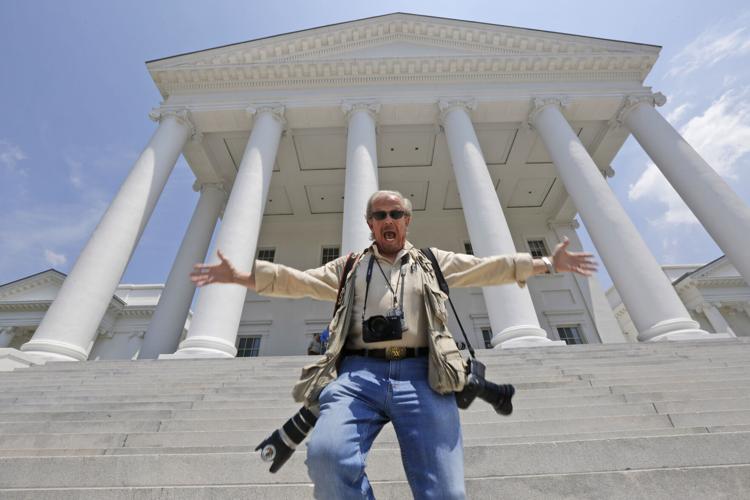
Immigration Cantor
In Richmond, Va., Wednesday, May 28, 2014. (AP Photo/Steve Helber)
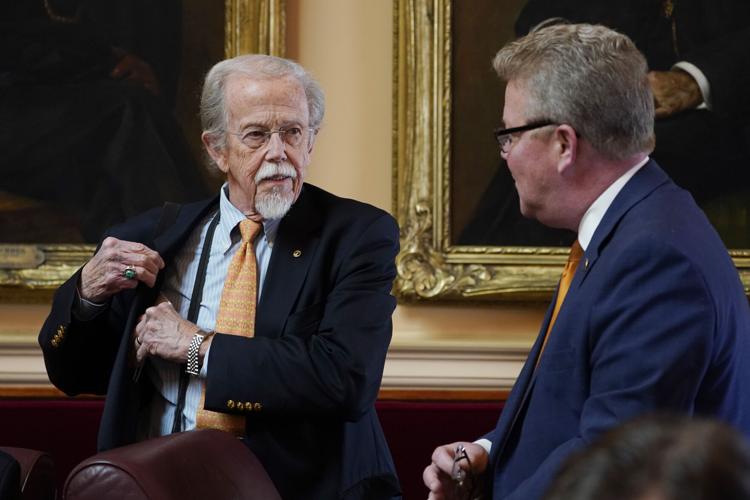
Virginia Legislature
At the Capitol Tuesday Mar. 1, 2022, in Richmond, Va. (AP Photo/Steve Helber)
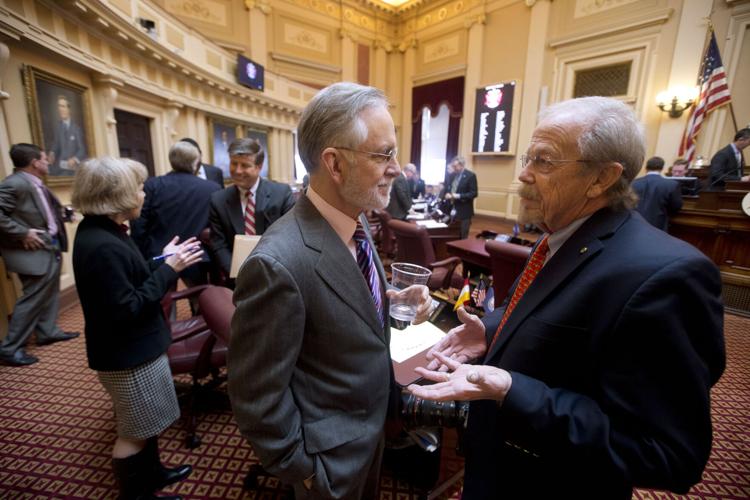
Legislatures Media Access
Bob Brown, right, and Sen. Tommy Norment during the Senate session at the Capitol in Richmond, Va., Friday, Jan. 15, 2016. (AP Photo/Steve Helber)

20220311_MET_BROWN_01
Bob Brown, right, and colleague Steve Helber of the Associated Press.

Reckless Driving
At the Capitol in Richmond, Va., Tuesday, Jan. 20, 2015. (AP Photo/Steve Helber)
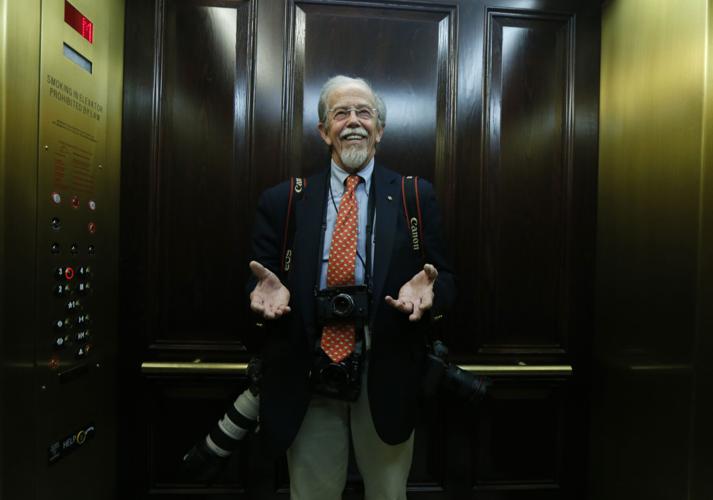
Virginia Lt. Gov. Accuser
At the Capitol in Richmond, Va., Sunday, Feb. 24, 2019. (AP Photo/Steve Helber)
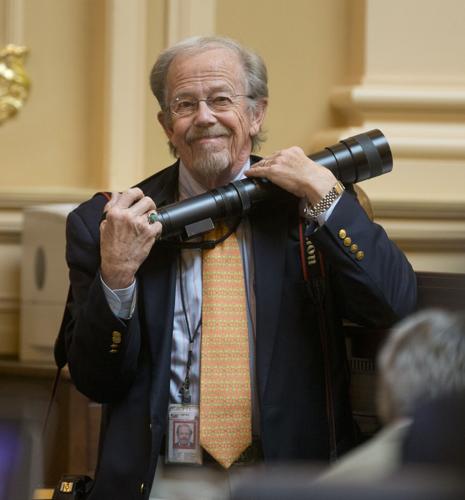
Session Midway
At the Capitol in Richmond, Va., Tuesday, Feb. 7, 2017. (AP Photo/Steve Helber)
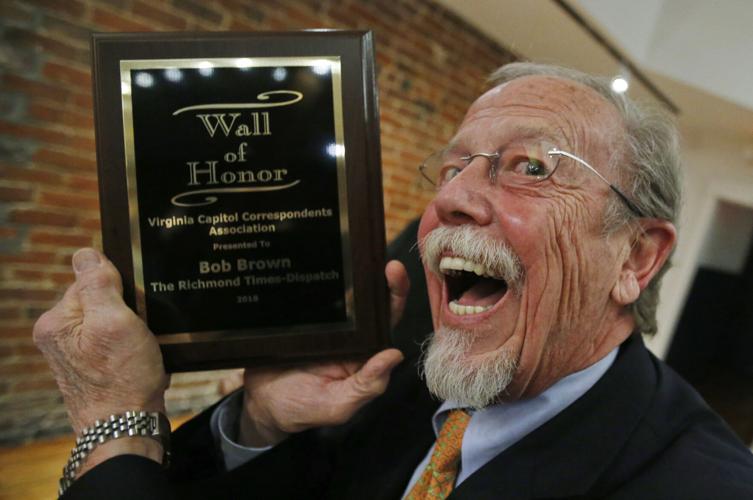
Donzi
A playful pose during the Virginia Capitol Correspondents dinner in Richmond, Va., Wednesday, Feb. 14, 2018. (AP Photo/Steve Helber)
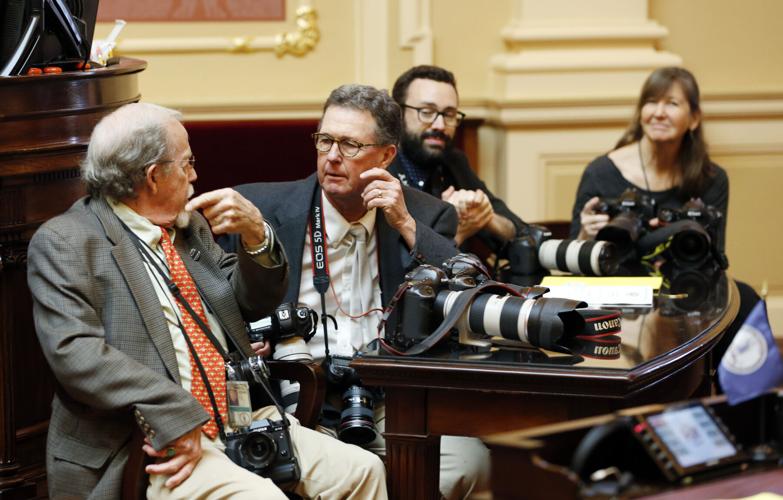
Virginia Politice Blackface
at the Capitol in Richmond, Va., Thursday, Feb. 7, 2019. (AP Photo/Steve Helber)
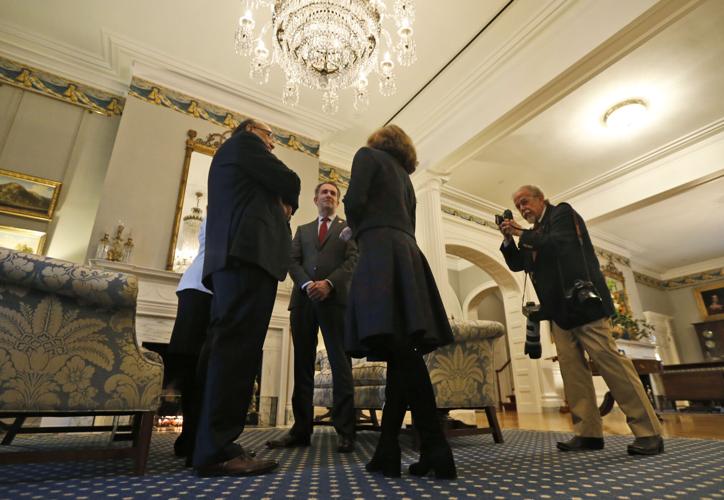
General Assembly Northam
Virginia Gov. Ralph Northam greets members of the Richmond 34 for a breakfast at the Governors Mansion at the Capitol in Richmond, Va., Friday, Feb. 22, 2019. The Richmond 34 were a group of African Americans who defied segregation laws in the 1960’s (AP Photo/Steve Helber)
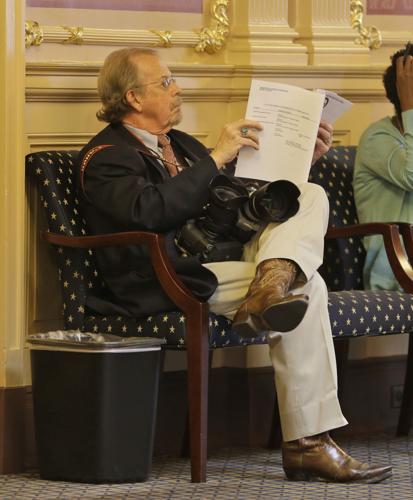
General Assembly
Wednesday, Jan. 30, 2013 in Richmond, Va (AP Photo/Steve Helber)

outboards
Waiting for the sentencing of former first lady Maureen McDonnell in Richmond, Va., Friday, Feb. 20, 2015. (AP Photo/Steve Helber)
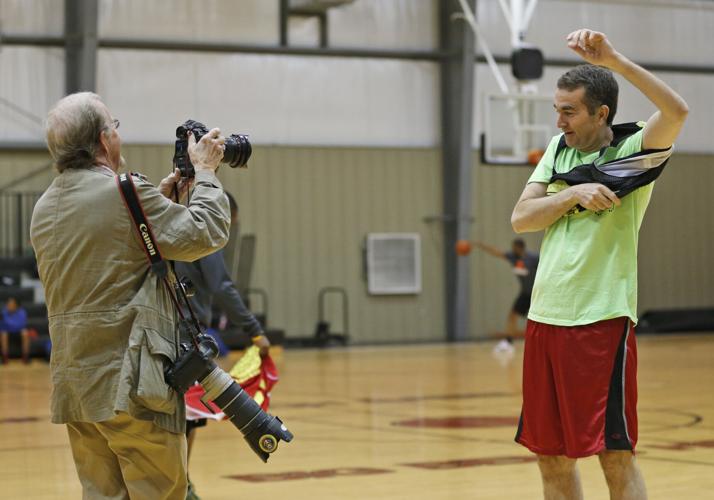
Govenors Race Northam
Bob Brown covers Virginia Lt. Gov. Ralph Northam prior to an exhibition basketball game in Richmond, Va., Tuesday, April 11, 2017. (AP Photo/Steve Helber)
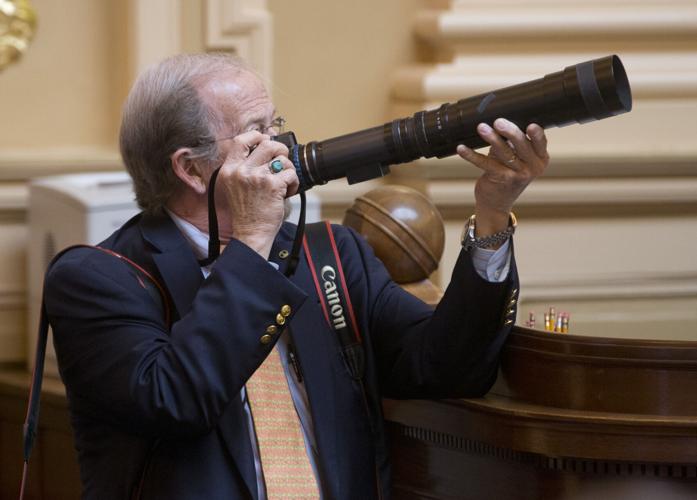
Session Midway
At the Capitol in Richmond, Va., Tuesday, Feb. 7, 2017. (AP Photo/Steve Helber)
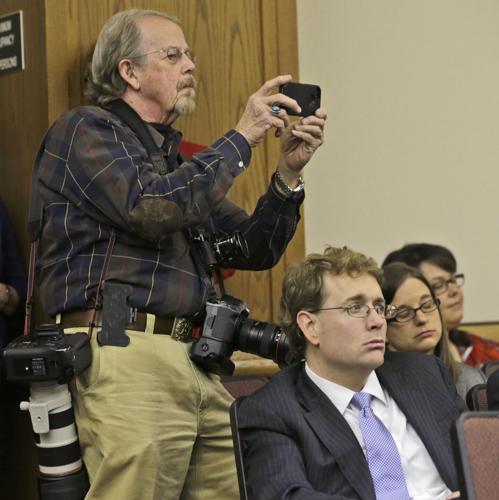
Virginia State Budget
Bob Brown covers the biannual budget during a meeting of the House Appropriations and Senate Finance committees at the Capitol in Richmond, Va., Monday, Dec. 16, 2013. (AP Photo/Steve Helber)

Virus Outbreak Virginia
Bob Brown arrives to cover a press conference by Virginia Gov. Ralph Northam at the Capitol Wednesday March 11 , 2020, in Richmond, Va. Northam provided an update on the states readiness to handle the Corona virus outbreak. (AP Photo/Steve Helber)
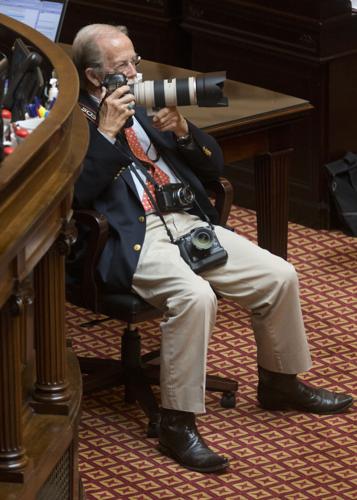
Medicaid Expansion
During Senate debate on the state budget which included Medicaid Expansion at the Capitol in Richmond, Va., Wednesday, May 30, 2018. . (AP Photo/Steve Helber)
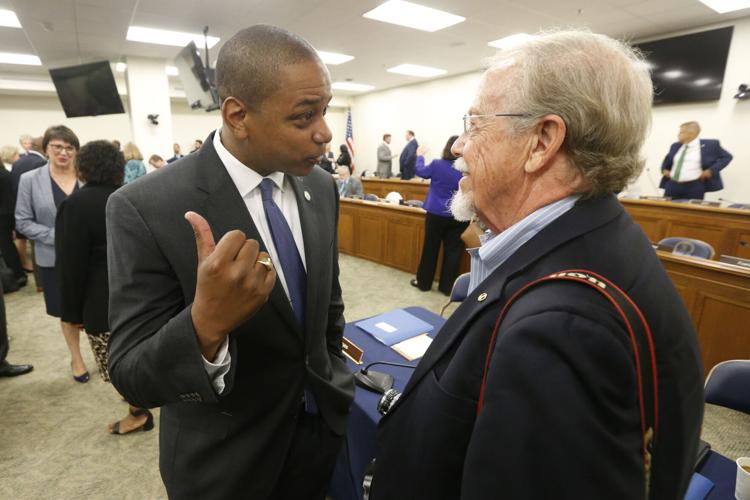
Northam Budget
Virginia Lt. Gov. Justin Fairfax stops to speak with Bob Brown as Gov. Ralph Northam delivered his budget update before a joint meeting of the House and Senate money committees at the Capitol in Richmond, Va., Tuesday, Aug. 20, 2019. (AP Photo/Steve Helber)

State Financees
Bob Brown at a press conference where Virginia Gov. Bob McDonnell announces a $311 million revenue surplus for fiscal year 2011, at the Capitol in Richmond, Va., Tuesday, July 19, 2011. (AP Photo/Steve Helber)
(804) 649-6964
(804) 649-6061
Twitter:@patrickmwilson
(804) 649-6254
Twitter: @MelLeonor_






